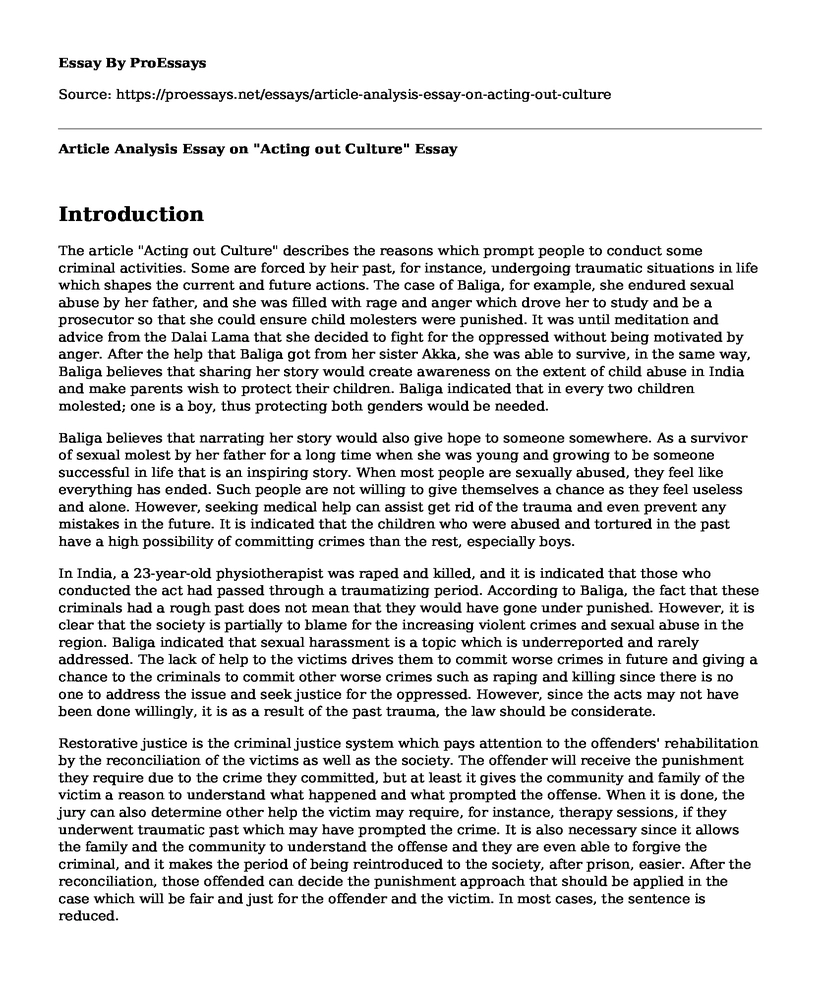Introduction
The article "Acting out Culture" describes the reasons which prompt people to conduct some criminal activities. Some are forced by heir past, for instance, undergoing traumatic situations in life which shapes the current and future actions. The case of Baliga, for example, she endured sexual abuse by her father, and she was filled with rage and anger which drove her to study and be a prosecutor so that she could ensure child molesters were punished. It was until meditation and advice from the Dalai Lama that she decided to fight for the oppressed without being motivated by anger. After the help that Baliga got from her sister Akka, she was able to survive, in the same way, Baliga believes that sharing her story would create awareness on the extent of child abuse in India and make parents wish to protect their children. Baliga indicated that in every two children molested; one is a boy, thus protecting both genders would be needed.
Baliga believes that narrating her story would also give hope to someone somewhere. As a survivor of sexual molest by her father for a long time when she was young and growing to be someone successful in life that is an inspiring story. When most people are sexually abused, they feel like everything has ended. Such people are not willing to give themselves a chance as they feel useless and alone. However, seeking medical help can assist get rid of the trauma and even prevent any mistakes in the future. It is indicated that the children who were abused and tortured in the past have a high possibility of committing crimes than the rest, especially boys.
In India, a 23-year-old physiotherapist was raped and killed, and it is indicated that those who conducted the act had passed through a traumatizing period. According to Baliga, the fact that these criminals had a rough past does not mean that they would have gone under punished. However, it is clear that the society is partially to blame for the increasing violent crimes and sexual abuse in the region. Baliga indicated that sexual harassment is a topic which is underreported and rarely addressed. The lack of help to the victims drives them to commit worse crimes in future and giving a chance to the criminals to commit other worse crimes such as raping and killing since there is no one to address the issue and seek justice for the oppressed. However, since the acts may not have been done willingly, it is as a result of the past trauma, the law should be considerate.
Restorative justice is the criminal justice system which pays attention to the offenders' rehabilitation by the reconciliation of the victims as well as the society. The offender will receive the punishment they require due to the crime they committed, but at least it gives the community and family of the victim a reason to understand what happened and what prompted the offense. When it is done, the jury can also determine other help the victim may require, for instance, therapy sessions, if they underwent traumatic past which may have prompted the crime. It is also necessary since it allows the family and the community to understand the offense and they are even able to forgive the criminal, and it makes the period of being reintroduced to the society, after prison, easier. After the reconciliation, those offended can decide the punishment approach that should be applied in the case which will be fair and just for the offender and the victim. In most cases, the sentence is reduced.
In the case of Conor McBride, who shot his girlfriend Ann Margaret Grosmaire, restorative justice helped in saving the life of Conor, and he was reconciled with the parents of the victim who had known him for a long time. According to the victim's mother, Kate Grosmaire, he knew Conor very well and even loved him and thus could not define him with the last moment of killing her daughter. Kate was willing to be visiting him in jail after he was incarcerated. When the court decided in the first time, Conor was charged with first-degree murder; thus he could have spent his entire life in prison. The victim's parents, however, indicated that they did not want that for Conor and required for a victim-offender dialogue. After listening to the case, it would guide the final judgment since the victims will be allowed to decide the best punishment. The parents of the victim first talked about how their daughter's dreams were brought to an end by her death. When Conor explained how he ended up killing his girlfriend, it left everyone speechless as he even recognized his mistake and indicated it was unexplainable. The final judgment was just as he received a fair punishment.
Conclusion
To conclude, restorative justice helps promote fair judgment. A crime may be committed due to past issues such as trauma and abuse. When the victims and the offenders have a dialogue, they understand each other. The offender takes responsibility for their actions and reconciliation takes place.
Cite this page
Article Analysis Essay on "Acting out Culture". (2022, Jun 16). Retrieved from https://proessays.net/essays/article-analysis-essay-on-acting-out-culture
If you are the original author of this essay and no longer wish to have it published on the ProEssays website, please click below to request its removal:
- Does the Crime Fit the Punishment?
- Research Paper on Crime Scene Investigators
- Essay Sample on Letter from Birmingham Jail: MLK's Rhetoric Tactics
- Essay Example on Myths and Misconceptions: How Detectives Handle Crimes
- FBI's Battle Against Homegrown Violent Extremists (HVEs): Timothy McVeigh - Essay Sample
- Essay Sample on Labelling Theory: Racism & Criminal Justice System
- Paper Example on Civil Rights Movement: Journey to Racial Equality in the US







